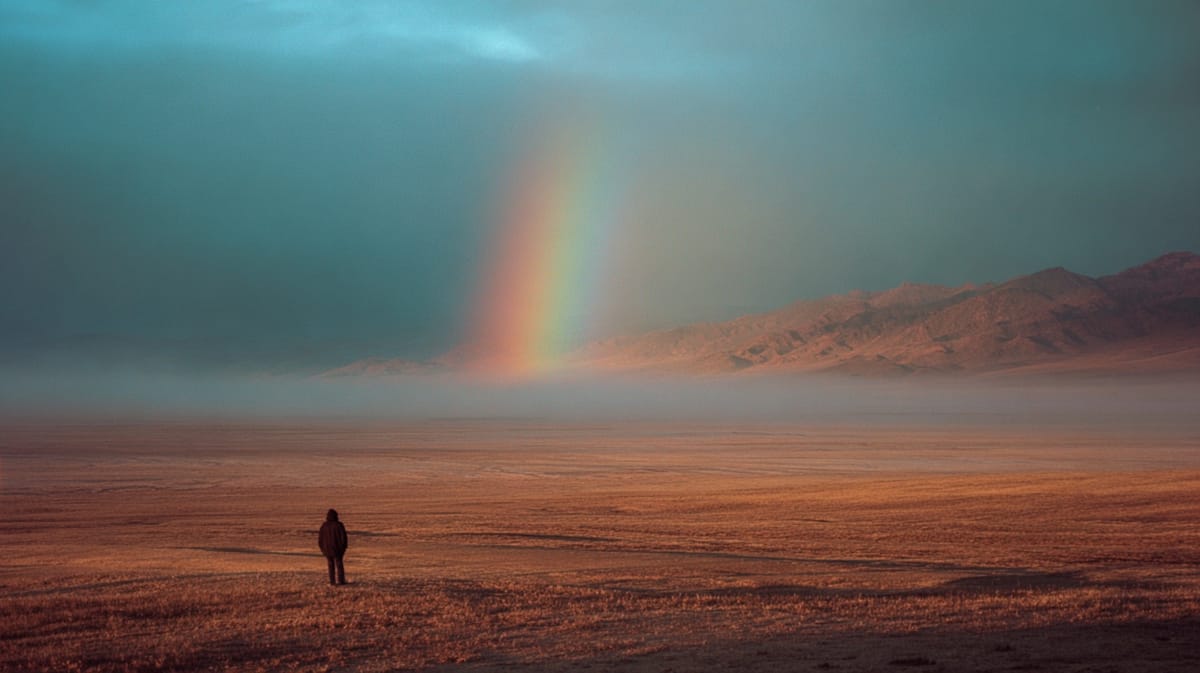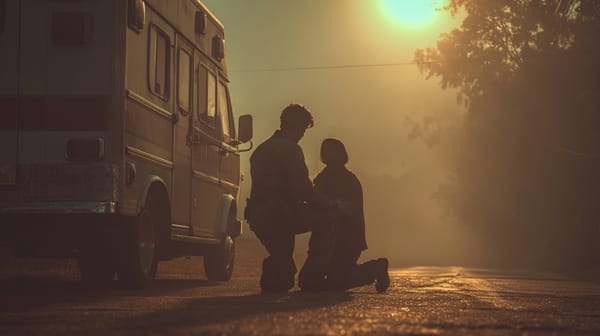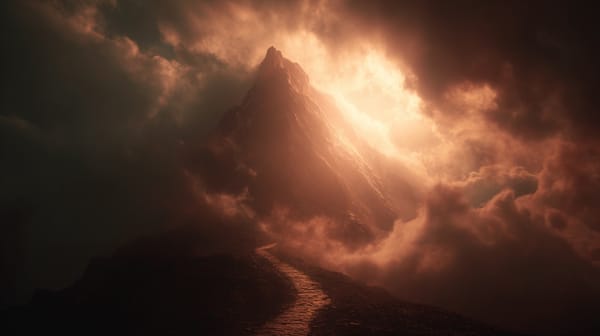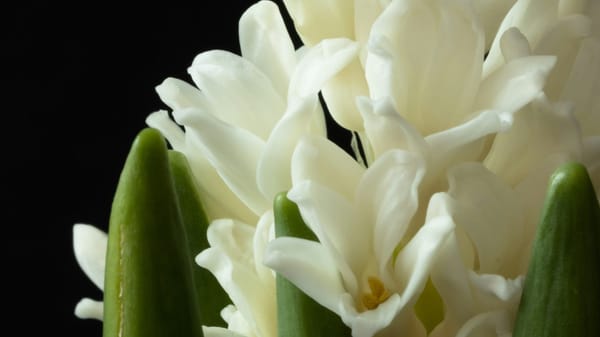Fairhaven Service 9-14-2025

In this week’s service, Rev. Dylan Parson delivered a sermon centered on the story of Noah from Genesis and its surprising parallels to J.D. Salinger’s Franny and Zooey. He challenged the congregation to reconsider Noah's role, noting that he doesn’s speak in the biblical account and essentially relinquishes control to God's will, responding only with action. This quiet faithfulness, the very thing that made Noah "a nobody" to his contemporaries, is what ultimately makes him remarkable in God's eyes.
The sermon explored the idea that true faith often involves letting go of personal ambitions and embracing a path chosen by God, even when it leads to difficult or seemingly pointless endeavors. Parson drew connections between Noah’s story and the call to persevere in faith, even when faced with uncertainty or disappointment. He concluded by sharing a prayer written by Bishop Ken Untner, emphasizing that we are "workers, not master builders," called to plant seeds and lay foundations without necessarily seeing the full harvest of our efforts, trusting that God will ultimately bring His kingdom to fruition.
Transcript
So a line from what is possibly my favorite book, one that has stuck with me since I was about 14. Just because I'm so horribly conditioned to accept everyone else's values, and just because I like applause and people to rave about me doesn't make it right. I'm ashamed of it. I'm sick of it.
I'm sick of not having the courage to be an absolute nobody. I'm sick of myself and everyone else that wants to make some kind of splash. That's from J.D.
Salinger's Franny and Zoe, which was written in 1957. Most people would know him for The Catcher in the Rye, the high school English class favorite. But this novel of his was always the one that really grabbed me. The speaker in this passage is Franny from the title.
She's a college student who was formerly nationally famous for being a child genius with a radio show. And she's in the midst of this kind of existential breakdown. She's trying to explain to her much shallower Harvard-educated boyfriend what's going on with her. And she finds herself completely disinterested in academics, in sports, in her social life, all the things she used to love.
And she's been overcome instead by this old book that she's been reading called The Way of a Pilgrim. It's real. It's an anonymous book written in the 1800s. And in that book, this Russian peasant decides that he's going to live the Apostle Paul's call to pray without ceasing.
And the peasant prays the Jesus prayer, Lord Jesus Christ, Son of God, have mercy on me, a sinner, with every breath that he takes, in and out with that same prayer. That's a pretty well-known practice among the Eastern Orthodox. And so Franny starts wondering if life is less about achievement and recognition and more something like that, learning to pray with every breath. She rejects this idea that life is for becoming somebody, reaching for admirable goals, traveling a course that others have decided is a good one.
And instead, maybe it's about turning inward, getting closer to God. And it feels ironic, but I guess it's a point that makes more and more sense to me the older I get. Franny becomes more of herself by letting go of herself. Letting go of this ego, the desire to be the one who's the protagonist of her own life.
She lets go of that and is able to become more herself. And I was surprised, you know, sitting with the story of Noah's Ark, that this is the book that came to mind as I was reading that. Why? Well, I guess because I've always figured out, I've always figured, speaking of protagonists, that Noah is the protagonist of Noah's Ark. But it turns out that's not really the case.
Across the three chapters of Genesis we skimmed across in our reading this morning, Noah doesn't even speak. Okay. Not one time did Noah say a word. Have you ever noticed that? I hadn't.
No, instead, Noah relinquishes literally everything to the will of God. Every single thing that Noah does in this story is in response to what God tells him to do. God will say something, Noah will do it. That's the entire pattern across three chapters here.
And this line struck me too, that whenever the flood came, whenever the animals were on board, whenever Noah and his family were on board, the Lord shuts the door behind them. Noah doesn't. God does. Noah is a man here who prays without ceasing to the point that he himself recedes into the background of this story and God becomes the main player.
Noah's entire significance is in that he walks with God. Maybe you noticed again, this is what Genesis says about him. This is chapter 6 verse 9. Noah was a good man, a man of integrity in his community.
Noah walked with God. And that way that I just quoted it now is from the message. But that line stays more or less the same in every translation I checked from the KGB, the KGB, the CEB, the NIV. Noah walked with God.
That one line stays the same. And that is the entirety of what makes Noah important. We don't hear anything in Genesis about Noah's story before God starts to plan the great flood. That said, I'm willing to guess that across all the preceding years of his life, Noah has not been particularly interesting.
Naturally, that probably changes whenever a 450-foot-long wooden ship appears in his backyard, but before that, we see no evidence that Noah's interesting. And I think we can be especially sure that Noah was probably not interesting by his world standards, because if he had become interesting or accomplished or important, it almost certainly would have been because he was participating in all the evil of his time. God says all the thoughts of human beings were evil, and Noah wasn't. So Noah remained unnoticed, maybe a disappointment to his parents and his loved ones for not amounting to much.
But God had noticed Noah in his quiet faithfulness. And precisely that quiet faithfulness is where Noah's uniqueness was found, not in standing out, The humility and the lack of ambition that made Noah a nobody to the people around him is exactly the same thing that made him remarkable to God. So finally one day, God comes to Noah. And in contrast to Noah, who again, totally silent, God talks a lot.
Much of what we heard was the voice of God. And God opens bluntly in his one-way discussion with Noah. The end has come for all creatures since they have filled the earth with violence. I'm now about to destroy them along with the earth, so make a wooden ark.
And God moves straight at that point from explaining what's going to happen to telling Noah what to do about it, presenting detailed instructions on the size, the shape of the ark, who's supposed to be on it, all that stuff. And there's no question or hesitation as to whether Noah's going to participate. He is, after all, one who walks with God, and this is where God is walking. So whatever vision Noah had for his life five minutes ago, which was probably a pretty low-key existence for the rest of his life, he lets all that go without saying a word.
And significantly, I'm not saying this is right or wrong because we see both in Genesis. Noah doesn't try to change God's mind like Abraham does later. He doesn't try to bend what God's going to do. Noah remains committed walking with God to follow the path that God has set before him and chosen him for.
And I hate to say it, but he faithfully walks with God down a path that is just truly terrible, right? One that is truly terrible beyond our imagining. This story, whenever you hear it, like divorced from kind of the picture book telling, is awful. Can you imagine what Noah feels like as he sets out to do his part here? He stares out at this familiar world around him while he's sawing the timber for his ship. His hands are getting blistered and he looks to all of his neighbors, all of his friends, like he's just a maniac, building this boat in the middle of dry land.
And he must have had such pain in his heart about this, knowing that everything, everyone he's ever known, is gone. Maybe Noah had this big tree that he liked to climb as a kid, right? It's going to be turned into driftwood. Or maybe it's just going to be one of thousands of other logs in this ship. Maybe there was this stream nearby where flowers would emerge along the waters once the winter had passed.
Maybe he'd go there and skip rocks when he was a kid. And that too, erased, gone. Maybe made into a great canyon if it's not gone entirely. And over there he's got his house, the farm, the vineyard where he established his family with his wife.
And over there are his neighbors, probably his cousins based on how this society worked on the other side of the fence. And they're gone too. And he knows that this is coming. God's told him exactly what's coming, but he is committed to walking with God pretty much into hell on earth here.
And I felt twinges sometimes of that ache of God taking me somewhere I don't want to go. And maybe you felt that too. And this won't come as any surprise to any of you, but I've lamented to pastor friends to Stormy that I could potentially be in the midst of overall decline and death in the church for my entire ministry career. Hearing these stories about whenever we had to pull out all the chairs to make room for people, whenever our buildings were full to bursting, whenever we had more money than we knew what to do with, 40 more years of hearing that on the downward spiral.
And it's quite possible also that Carnegie is not the last church I close. Even as I kind of resent, kind of, I really resent that I had to do that in my very first appointment. Three years out of school, ready to serve the church, down one. That building had been there since the Civil War.
My name's on it whenever they put a lock on the door, right? No one gets into ministry for that. To be clear here, I'm not saying that I'm resigned to letting that happen as far as I can help it, and neither should you be. We're in the business of building things up with the gifts that God gives us. We should never be given into gloom and doom to assuming our best days are behind us.
I think that's a sickness that afflicts Pittsburgh overall. We always assume that the best time that we're ever going to have was about 40 years ago. we often worry about the years to come. You know, how can we continue serving God and our community in this place? What is it gonna be like to continue to live and serve here? And we're always supposed to be doing the best that we can for the kingdom of God.
We're supposed to responsibly steward the gifts that God has given us, doing the most with what we have, hoping that God will work miracles among us because God always does. Trusting that God's grace is at work, not only in the high points, but in every season. And this is true in all aspects of our lives. Not just the church, but whatever God has called you to, both within the church and beyond it, in your personal life and your work, it's crucial that you do that the best that you can.
Trusting that God's going to make it into something good. But still, this unpleasant truth that Noah reveals to us is that God pretty frequently calls God's people to this steady, invisible faithfulness in very, very hard times. That might even be the norm across scripture. And our job is to walk with God, like Noah, to the very best of our ability, doing what God asks us to do without being attached to the outcome.
And that's a really fine line to walk, right? That you're going to do your best without knowing for sure what's on the other side. And none of this is licensed, again, to give up, to stop caring what happens, but it's a call to persevering without any condition. Like, I'm not going to keep doing it as long as I keep seeing good stuff happening. No, you're supposed to keep doing it anyway, right? We ended our reading this morning at Genesis 8, 22, and God's promise never to destroy the world again.
That's where we stopped. But there's a famous image also in chapter 9 that you all know, when we get this famous, beautiful moment where God casts a rainbow in the sky, maybe the first rainbow. And the rainbow, God says, is going to remind God and us that he's never going to flood the earth again. But what do you think that means to Noah, really? What consolation is that to Noah, the guy who lived through it the first time? Regardless of whether that's going to be the only time, it still happened.
It's hard to imagine that seeing a rainbow is ever going to give Noah this warm, fuzzy feeling when he sees it after a storm. It's not going to feel good to see it. Instead, it's going to remind him that God will never flood the earth again, but he already did. And what must that feel like to be the one who's left standing? And so every rainbow now for the remaining 350 years of Noah's life, Noah lives to be 950 years old.
Must have been like a PTSD flashback, seeing that rainbow. Really. It wouldn't feel like a promise. It would feel like a scar.
And so truthfully, I think we can come away from this story without being too happy with God. I feel like Noah probably wasn't too happy with God. And that's okay. We see throughout Scripture, throughout the Psalms, that God can take that.
God is accepting whenever we're not having a good time with God, we can tell God that. God can handle our questioning, our uncertainty, our aching, our disappointment in where we've come. And while this doesn't make the pain and the ache and the doubt go away, it is worth remembering that this story is so much bigger than us and our individual lives. Think about Noah.
Noah doesn't know about Abraham. Noah doesn't know about King David. Noah doesn't know about Jesus, all of whom are going to be his descendants. Noah doesn't know that through his descendants, not only will they repopulate the earth, get things back on track, Abraham.
creation will be cleansed once more. Not with a flood of water, but with a flood of grace this time, drawn back to God that has been left behind since the Garden of Eden. That's coming to be repaired. Noah isn't the main character in his story, and the greater story doesn't end with him.
It goes on so much longer. We're still in it. In the same way, we're not the main character in our lifetimes. We're not the main character in this world, in Christ's church, not even this church.
All of this is so much bigger than us as God brings to fullness the salvation that was planned since before the beginning. And so we pick up our cross for a while. We walk through joy, pain, ups and downs, water and mountaintops, drawing closer to God through it all until we enter the glory of a new heaven and a new earth that Noah hadn't heard about that either. And unlike poor Noah, we know that not only can we walk with God, God has walked on earth with us in Christ and does now in the power of the Holy Spirit.
God has felt our pain in his own body. God has died our death and conquered it. And he sent the Spirit never to be taken away from us. We're not alone.
And God does not promise us final victory in our time on earth, although who knows, maybe someone's going to get it. We're not alone. But we have already received something better than that. Living in this life requires real bravery, but God gives us what we need to make it through that.
The courage to be an absolute nobody, as Franny Glass calls it, is something we must develop in order to be the people, to be the church that God has called us to be. And of course, we might not end up being nobody. That might happen. We might end up living in this golden age of the church.
We might even live to see the return and the victory of Jesus Christ. We might live to be heroes of the faith, you know, saints that are remembered forever. They could have a stained glass window of you somewhere someday. But maybe all these things are only possible if we're willing to live our lives quietly devoted to a God whose story is bigger than ours, even when things seem hopeless, even when God calls us to places that we don't want to go.
In late 1979, the Catholic Bishop Ken Untner of Michigan was asked to write a prayer. And this was a prayer for a service in memory of Archbishop Oscar Romero. Archbishop Romero had been martyred in El Salvador earlier that year. He fought for the poor, the marginalized of that country against an oppressive authoritarian government.
And he was shot and killed while he was serving communion at a hospital. And the Archbishop was one who walked with God without ever seeing the fruit of what God was doing through him. He's a saint now. He didn't live to see that.
In 2015, during the process of canonizing Archbishop Romero, Pope Francis offered this prayer that Bishop Untoner wrote once more in his Christmas address at the Vatican. This prayer that he wrote has become known as the Prayer of St. Oscar Romero by, But I think it would resonate with Noah too. And it does with me.
So here's this prayer. We're going to do this. I just would ask you to pray with me. We'll do this instead of the Apostles Creed today.
If you lift up your hearts. It helps now and then to step back and take a long view. The kingdom is not only beyond our efforts, it's even beyond our vision. We accomplish in our lifetime only a tiny fraction of the magnificent enterprise that is God's work.
Nothing we do is complete, which is a way of saying that the kingdom always lies beyond us. No statement says all that could be said. No prayer fully expresses our faith. No confession brings perfection.
No pastoral visit brings wholeness. No program accomplishes the church's mission. No set of goals and objectives includes everything. This is what we're about.
We plant the seeds that one day will grow. We water seeds already planted, knowing they hold future promise. We lay foundations that will need further development. We provide yeast that produces far beyond our capacities.
We cannot do everything and there's a sense of liberation in realizing that. This enables us to do something and to do it very well. It may be incomplete, but it's a beginning, a step along the way, an opportunity for the Lord's grace to enter and do the rest. We may never see end results, but that is the difference between the master builder and the worker.
We are workers, not master builders. Ministers, not messiahs. We are prophets of a future, not our own. In the name of the Father and the Son and the Holy Spirit.
Amen.



